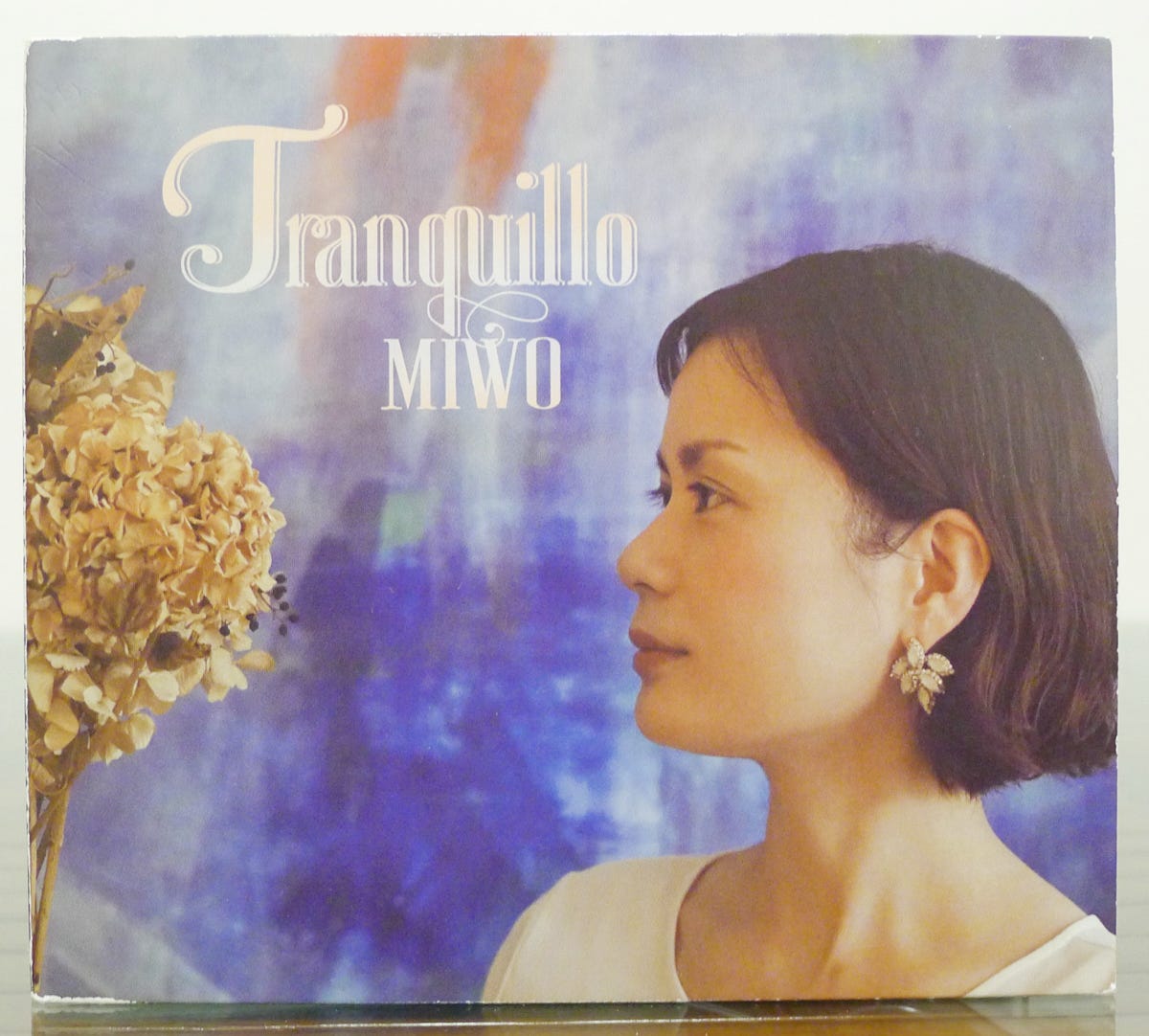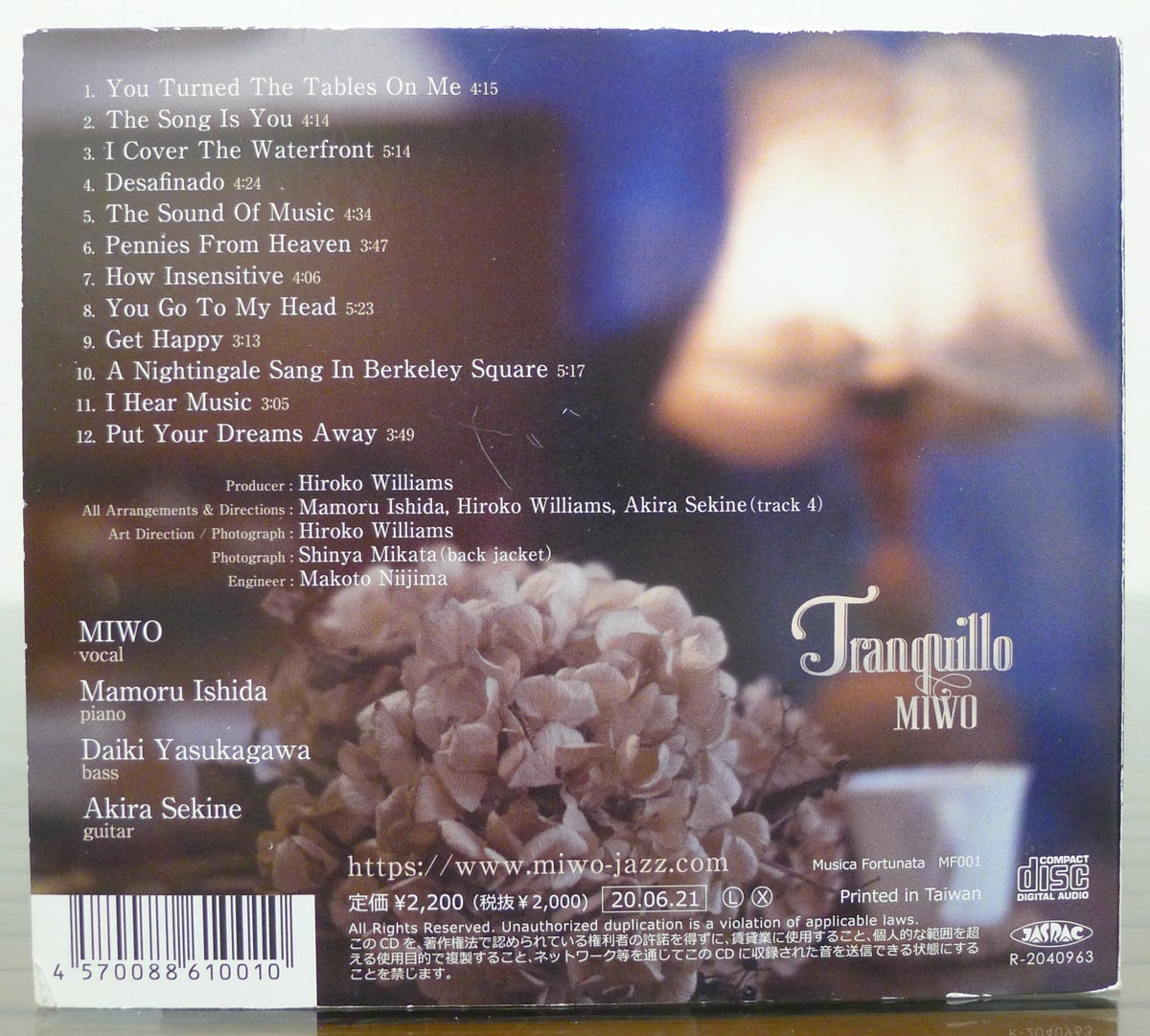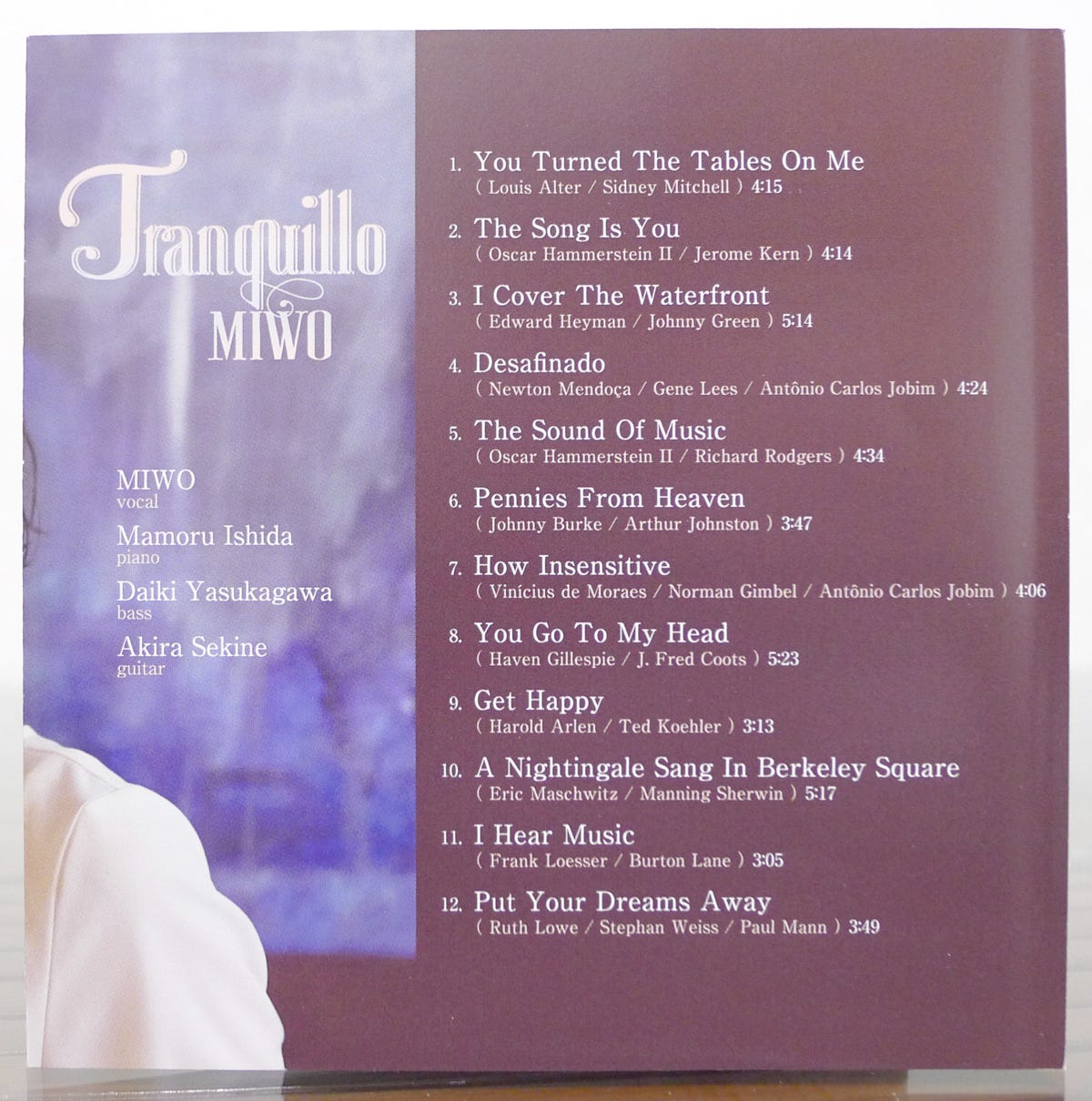Miwo: Tranquillo
Jazz singer MIWO’s first album is entitled Tranquillo from 2020. This fifty-one-minute album delivers a sincere and straightforward set of twelve jazz standards perfectly suited to the leader’s modestly beautiful voice. Tranquillo was produced by mentor Hiroko Williams, a well-known jazz singer in her own right, and the result is an album with an authentic approach to vocal-focused jazz albums.
While some decorative intros, endings, and arrangements are subtly attached, the performances follow the original music closely to respectfully elevate the original compositions and allow the immediately felt vocals to shine.
The four-piece group of vocals, piano, guitar, and upright bass delivers quiet renditions of classic tunes to uplift the mood, such as “The Song is You”, “Pennies From Heaven”, and “Get Happy” in fairly short, three-to-five minute takes with a direct and pure sound.
Throughout, a sense of lightness and ease persists throughout the recording. While the liner notes describe a theme of visible light broadcast through the singer’s voice, there is also a sense of lightness as in buoyancy, a floating, lighter-than-air vocal quality from MIWO that successfully creates a pleasant musical atmosphere from the timeless melodies. Indeed, there seems to be an appreciation of the old-fashioned qualities of this rose-petal music, short, sweet, and soothingly presented.
Liner Notes
(Translation of Tomoyuki Hoshino’s original Japanese liner notes.)
Experience the light.
Sometimes it is the flickering light of a candle set on a table at a bar where lovers meet. Sometimes it is the hazy heat of sunlight rising on a beach on a comfortably lazy afternoon. Sometimes it is the light of a movie projector telling a thrilling tale on a screen at a movie theater from long ago…
MIWO’s singing voice brings to mind these various scenes of light. It’s a voice that evokes light, a rare singing voice that carries a unique radiance. As for the source of this light source, it seems to be her approach to words.
The twelve songs contained on this album make such a vivid impression firstly by the clarity of the lyrics she sends forth. Although the lyrics are sung quite casually almost as whispers, each word clearly vibrates the air and resonates in the hearts of the listeners. Moreover, each word flows smoothly and does not disrupt the flow of the original melody. Or rather, each quietly enhances the emotional swells. Considering light itself, it has the contradictory properties of being composed of photon particles and waves with wavelengths. Truly, MIWO’s singing voice is similar in the expression of clarity of speech and fluency of singing are expressed together in a single song with exquisite balance, no doubt a difficult achievement.
This must be an indication of the fact that the singer MIWO, above all else, is dedicated to delivering lyrics to the listener with care and sincerity. This is because there is no simple prescription for achieving that delicate balance. She reads the lyrics many times over, superimposing her own feelings, and singing them over and over again, aiming to convey those feelings with every note. Light can only be produced from this task without shortcuts or loopholes.
And the light that emanates from this earnest trial and error illuminates different angles on these classic oft-sung songs, bringing out new expressions. Listening to MIWO’s debut album reveals the world of the album assembled from four elements like a mosaic: from uptempo jazz numbers to medium slow ballads, bossa novas, and film music, with all of the four hues fresh and lively. The album opens with “You Turned The Tables On Me”, impressively announced with a lightly ticking rhythm from MIWO’s vocals, about someone who, just like an Othello board where the players’ positions have suddenly been reversed, thought they had the initiative in the game of love but suddenly realize it’s themself who has fallen for the other person. It’s a jazzy song full of wit that has been sung by Billie Holiday, Ella Fitzgerald, and Louis Armstrong. Contrastingly, the song “Put Your Dreams Away” gently and quietly closes the album, a ballad number which could be said to be an early theme song for Frank Sinatra (used in fact as the theme music for his radio programs and television shows). MIWO’s whispering of “Throw away your dreams, I’ll fill the gaps” echoes beautifully and leaves a long-lasting impact.
From the world of movie musicals, “The Sound of Music” and “Get Happy” were selected. “Get Happy” was sung by Judy Garland (who is receiving reevaluation and praise as a result of the 2019 biopic Judy) in the movie Summer Stock where she sang and danced alongside Gene Kelly. At the same time, the bossa nova masterpiece “How Insensitive” and the naturally included “Desifinado” were composed by Antônio Carlos Jobim and sung by Astrud Gilberto, widely known for capturing the world’s attention with “The Girl from Ipanema”. From these musical and bossa nova numbers, MIWO uncovers their musical essence and abundant richness, weaving them seamlessly into one world with jazz standards. As a result, this album has even rehued the memories of these brilliant singers who have left their marks forever in musical history by bringing to life MIWO’s voice in the here and now. What distinguishes MIWO from the singers who inspired her to pursue jazz, from Judy Garland and Astrud Gilberto to Billie Holiday, Ella Fitzgerald, Carmen McRae, and of course Sinatra and Satchmo, is the brightness of the light she emits through words to illuminate this unique theatrical world.
Actually, if you think about it, perhaps it is just those who can bring a new light into songs who possess the qualifications to sing standard numbers. It is in this way that songs are imbued with new life and continue to be sung further into the future.
MIWO’s voice certainly possesses that beautiful qualification. This album’s title is Tranquillo, which is a musical term of Italian origin that means in a quiet and calm manner. If you close your eyes, lay down in a quiet and calm place, and let her voice reflect its light on the surface of the mirror of your mind, you too will surely be convinced of this. In the midst of this unique twinkling light, various scenes will shimmer and emerge.
Tomoyuki Hoshino (Aoi Hoshi Tsushinsha, former editor-in-chief of Tokyo Calendar)
Tranquillo by MIWO
MIWO - vocal
Mamoru Ishida - piano
Daiki Yasukagawa - bass
Akira Sekine - guitar
Released in 2020 on Musica Fortunata as MF-001.
Japanese names: Mamoru Ishida 石田衛 (Ishida Mamoru) Daiki Yasukagawa 安ヵ川大樹 (Yasukagawa Daiki) Akira Sekine 関根彰良 (Sekine Akira)
Audio and Video
Excerpt from “Desifinado”, track #4 on this album:








